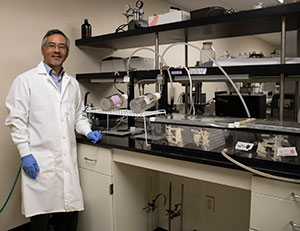UW School of Pharmacy Associate Professor Studies Dangers of E
Published November 11, 2022

Walking around any university campus in the United States will reveal many familiar scenes, such as lots of bicycles and students with backpacks. Another increasingly common sight is students using electronic cigarettes.
The dangers associated with e-cigarettes have prompted Guanglong He, an associate professor of medicinal chemistry with the University of Wyoming’s School of Pharmacy, to investigate the real harm to those using these products.
His research project, “E-Cigarette Vaping and Cardiopulmonary Injury,” is supported by a 12-month supplement grant totaling $125,000 through the National Institutes of Health-funded Phase 1 Sensory Biology Center of Biomedical Research Excellence at UW. He presented an update Oct. 27-28 via a virtual National Institutes of Health (NIH) EVALI webinar.
“I was very proud to represent the University of Wyoming presenting our research during this NIH-organized webinar and certainly hope that more research funds will be invested to support this type of research to curb electronic cigarette vaping-associated public health issues,” He says.
Referred to as vaping, the use of e-cigarettes has increased sharply over the last several years, in large part due to the affordability and misconceptions that vaping is safer than regular cigarettes -- either for young people experimenting with nicotine or adults trying to quit the habit of smoking real cigarettes.
He’s research experience includes extensive training in biomedical sciences and cardiovascular and pulmonary pathophysiology, encompassing areas from molecular and cellular biology, pharmacology and metabolic syndrome to cardiovascular and pulmonary diseases.
The EVALI presentation was a progress report to NIH on the supplement grant studying injuries to the heart and lungs from e-cigarettes. The research is geared toward developing therapeutic interventions aiming to curb vaping-related adverse health effects. The research progress has been published in the Journal of Molecular and Cellular Cardiology, with contributions from He Lab student members including Yohannes Getiyeost, a postdoctoral researcher with NIH; Matthew Peterson, of Cheyenne; Brandon Phillips, of Torrington; Daniel Carrillo, of Laramie; and UW collaborator Bledar Bisha, an associate professor with UW’s Department of Animal Science. Additional support has come from the Wyoming IDeA Networks of Biomedical Research Excellence program.
“Using a custom-built small animal aerosol exposure system, the study finds that chronic electronic cigarette vaping induces pulmonary and systemic inflammation with adverse changes to the lungs and heart,” He says. “A particularly interesting finding is that our immune response may help contribute to the adverse injury in vaping individuals.”
Qian-Quan Sun, director of UW’s Sensory Biology Center and a professor of zoology and physiology, says He’s research aligns well with the goals of the National Institute of General Medical Sciences (NIGMS).
“Dr. He’s research fits nicely with the research goals outlined by NIGMS,” Sun says. “Dr. He’s published research, while contributing significantly to our understanding of the molecular changes caused by vaping, provides much-needed data to support future preclinical and clinical research in this important area.”
“Dr. He’s research addresses a significant social issue and provides the groundwork for evidenced-based policymaking,” says Kem Krueger, dean of the UW School of Pharmacy. “I appreciate his research and service commitment to help the citizens of Wyoming and the country.”
Many studies and especially recent reports have revealed serious lung injury associated with e-cigarettes. However, much remains unknown about underlying disease mechanisms associated with vaping. Therefore, research efforts such as He’s are needed to address the potential adverse effects of e-cigarettes on human health, particularly lung injury affecting all users.
Following He’s NIH webinar presentation, respective institutions from NIH will determine additional funding to support further research on the pathological effects of electronic vaping on human health.
To learn more about He and other research faculty in the School of Pharmacy, visit www.uwyo.edu/pharmacy/faculty-and-staff-directory/research-personnel.html.
About the College of Health Sciences
UW’s College of Health Sciences trains health and wellness professionals and researchers in a wide variety of disciplines, including medicine, nursing, pharmacy, communication disorders, social work, kinesiology, community and public health, and disability studies.
The college also oversees residency and fellowship programs in Casper and Cheyenne, as well as operating primary care and speech/hearing clinics in Laramie, Casper and Cheyenne. With more than 1,600 undergraduate, graduate and professional students, the college is dedicated to training the health and wellness workforce of Wyoming and conducting high-quality research and community engagement, with a particular focus on rural and frontier populations.

